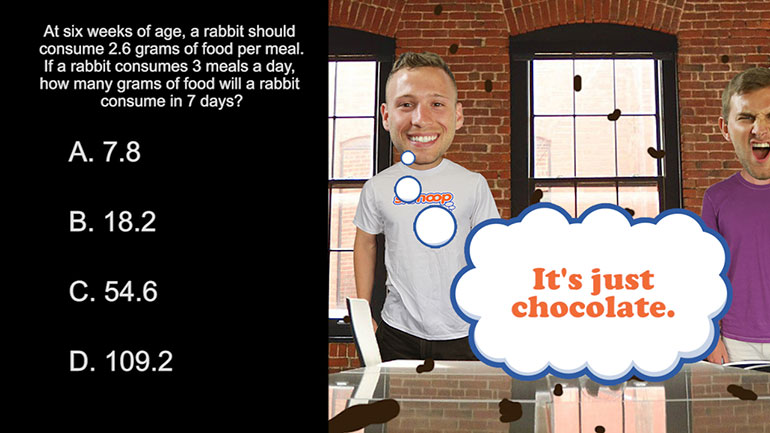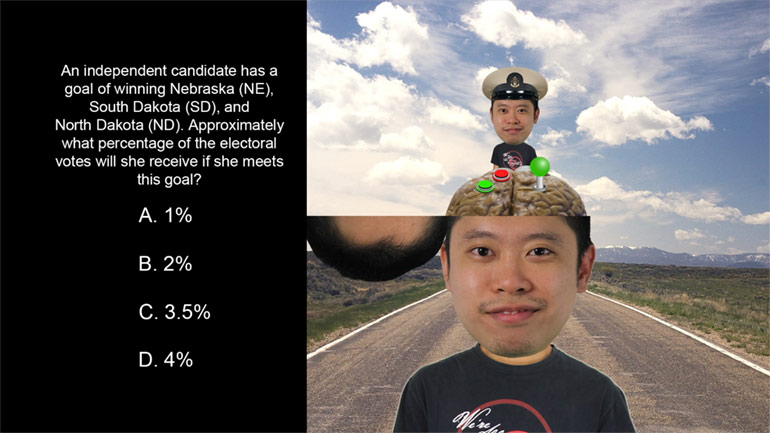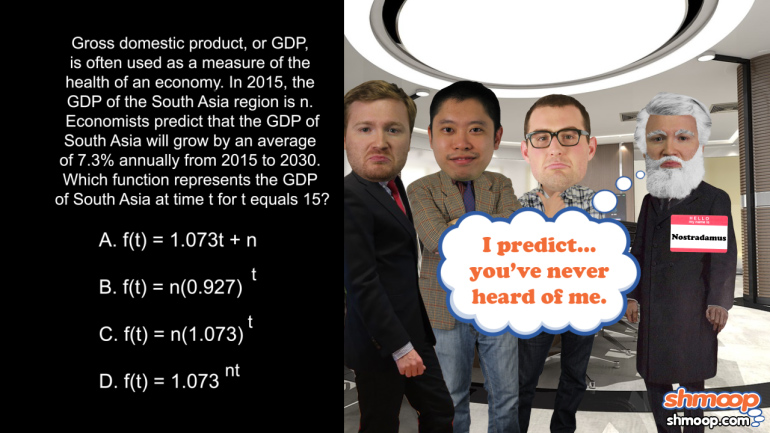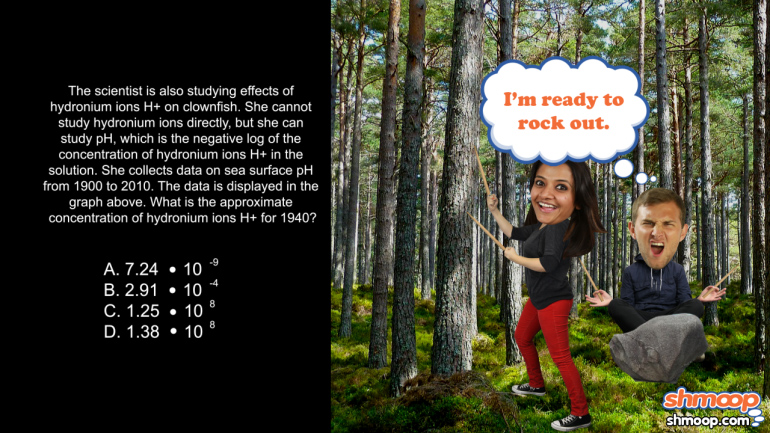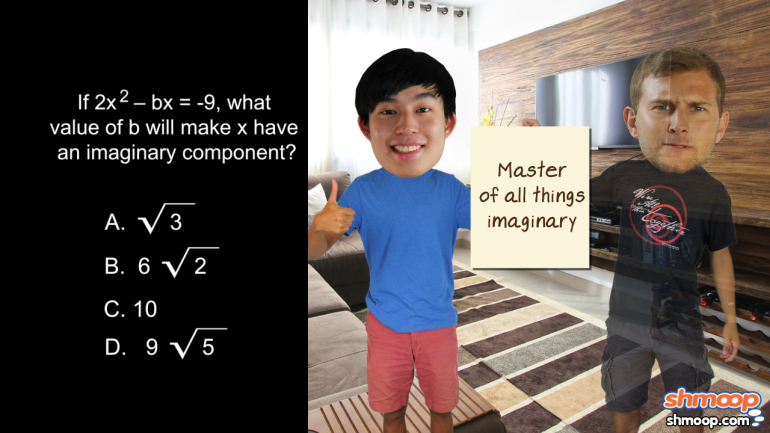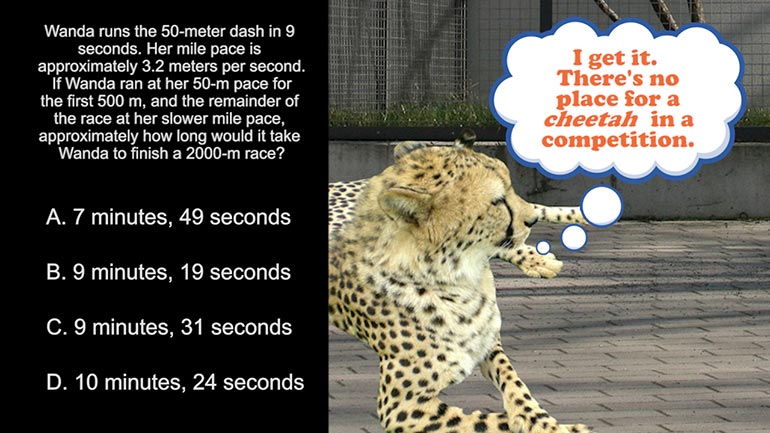ShmoopTube
Where Monty Python meets your 10th grade teacher.
Search Thousands of Shmoop Videos
PSAT Math Diagnostic Videos 41 videos
PSAT 1.1 Math Diagnostic. If a rabbit consumes 3 meals a day, how many grams of food will a rabbit consume in 7 days?
PSAT 1.10 Math Diagnostic. Which of the following is a factor of the expression?
PSAT 1.3 Math Diagnostic. Which of the following most nearly represents the line of best fit?
PSAT 1.6 Math Diagnostic 213 Views
Share It!
Description:
PSAT 1.6 Math Diagnostic. Which of the following is most likely to be an accurate statement about Americans over the age of 25 in 2011 with a Bachelor's Degree?
More Video DetailsTranscript
- 00:00
Thank you We sneak And here's your shmoop du jour
- 00:05
brought to you by the study of mankind Oh the
- 00:09
humanities All right check out this table Survivors connect to
- 00:13
the level you sent around Damn it All right in
- 00:18
two thousand eleven there were approximately fifty nine million americans
Full Transcript
- 00:21
over the age of twenty five with a bachelor's degree
- 00:24
using the data from the survey which of the following
- 00:26
is most likely to be an accurate statement about americans
- 00:29
over the age of twenty five in two thousand eleven
- 00:31
with a bachelor's degree your pencil answers and uh that
- 00:35
makes sense of my looking table Okay we're looking for
- 00:38
the one accurate statement which means we've got three impostors
- 00:41
on the loose it's our job to round them up
- 00:43
and then we'll send him jail Just call it mission
- 00:46
in pasta rebel or don't like okay so before we
- 00:50
get to the answer choices let's grab a nearby scalpel
- 00:53
hopefully have one handy and dissect this sucker question tells
- 00:57
us that in two thousand eleven there were approximately fifty
- 00:59
nine million americans over the age of twenty five with
- 01:01
a bachelor's degree Well looking at where the total column
- 01:05
is and the total roe in our table we can
- 01:08
see that there were nine hundred thirty nine thousand seven
- 01:11
hundred six people surveyed that's Just a bit fewer than
- 01:14
fifty nine million So how are we supposed to know
- 01:17
anything about all those other folks Considering we have fewer
- 01:20
than a million results now Unfortunately that simple idea of
- 01:23
serving as long as there's a large enough sample size
- 01:26
and almost a million sounds pretty good sized to us
- 01:29
We can rely on the percentages to tell us something
- 01:32
about the bigger picture How much is nine hundred thirty
- 01:36
nine thousand seven hundred fifty six in relation of fifty
- 01:39
nine million Well we can figure that out simply by
- 01:41
dividing them one into the other So nine three nine
- 01:44
seven five six divided by fifty nine million is point
- 01:47
pull one five nine In other words the people surveyed
- 01:51
represent roughly one point five Nine percent of the total
- 01:55
population of twenty five and over Bachelor degree holders Now
- 01:59
let's check out the first answer choice option A about
- 02:01
nine point two million women would have held a bachelors
- 02:05
degree in science and engineering Well according to our table
- 02:09
there were sixty five Thousand seven hundred sixty one Women
- 02:11
with a bachelor degree in science and engineering That's based
- 02:14
on the surveys Sample size How many are likely to
- 02:17
fall into that category out of the entire fifty nine
- 02:20
million We'll figure that out We need to know how
- 02:22
many times One point five nine goes into one hundred
- 02:26
Okay division time hundred divided by one point five Nine
- 02:29
is a sixty two point eight nine called sixty three
- 02:32
What that means is that any number in our table
- 02:35
can be multiplied by sixty two point eight nine And
- 02:38
we'll have a pretty good idea of how many men
- 02:40
are Women could be expected to fall into this or
- 02:43
that category when we take absolutely everybody into account So
- 02:47
for option a we take sixty five thousand seven hundred
- 02:49
sixty one multiplied by sixty two point eight nine to
- 02:51
get around four point one million Not quite The nine
- 02:54
point two million we need Is it all right let's
- 02:56
Try another one See about twenty seven point eight million
- 02:59
men would have held a bachelor's degree in arts and
- 03:02
humanities Well going back to our table Looks like of
- 03:05
the men surveyed Two Hundred forty four thousand seven hundred
- 03:07
eighty two of them had degrees in arts and humanities
- 03:10
multiplying that by sixty two point eight nine we get
- 03:12
about fifteen point four million not even in the neighborhood
- 03:16
What about d About three point two million men would
- 03:18
have held a bachelor's degree in education Well here we
- 03:21
take fifty seven thousand two hundred seventy nine and multiply
- 03:23
that by sixty two point eighty nine which would give
- 03:26
us around three point six million blue clothes but no
- 03:29
peace pipe Well then hopefully option b works out about
- 03:32
twelve point Eight million women would have held a bachelor's
- 03:35
degree in arts and humanities So two hundred three thousand
- 03:38
six hundred ninety one time sixty two point eight nine
- 03:40
and we get twelve point eight million it's a match
- 03:44
The imposters have been apprehended and what old man Wilkins 00:03:48.083 --> [endTime] uh we should have known
Related Videos
PSAT 1.1 Reading Diagnostic. The main purpose of the first two paragraphs is to...what?
PSAT 2.2 Reading Diagnostic. What is the main rhetorical effect of this phrase in the second paragraph?
Writing Diagnostic. To make the paragraph most logical, sentence 2 in the second paragraph should be placed...where?
PSAT 1.4 Writing Diagnostic. Which choice most effectively combines the two sentences in the underlined portion?
PSAT 1.5 Writing Diagnostic. How should the underlined portion be changed in the passage, if at all?
